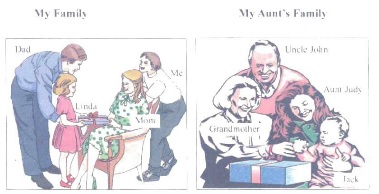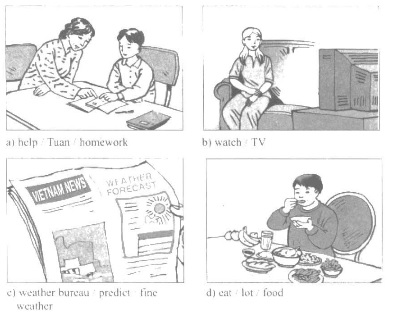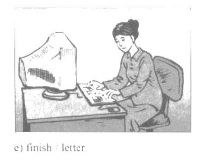B├ái hß╗ìc Ngß╗» ph├íp Language Focus Unit 8 Lß╗øp 9 - Celebrations hã░ß╗øng dß║½n c├íc em ─æiß╗âm ngß╗» ph├íp mß╗øi vß╗ü mß╗çnh ─æß╗ü quan hß╗ç v├á mß╗çnh ─æß╗ü trß║íng ngß╗» chß╗ë sß╗▒ nhã░ß╗úng bß╗Ö.
1. Grammar Language Focus Unit 8 Lß╗øp 9
1.1. Adjectives/ Relative clauses (Mệnh đề tính từ / quan hệ)
1.2. Relative adverbs (Trạng từ quan hệ)
1.3. Preposition + Relative pronoun (Giß╗øi tß╗½ + ─æß║íi tß╗½ quan hß╗ç)
1.4. Reduction of concessive clauses
2. Exercise Language Focus Unit 8 Lß╗øp 9
2.1. Unit 8 Lß╗øp 9 Language Focus Exercise 1
2.2. Unit 8 Lß╗øp 9 Language Focus Exercise 2
2.3. Unit 8 Lß╗øp 9 Language Focus Exercise 3
Tóm tắt bài
1. Grammar Language Focus Unit 8 Lß╗øp 9
1.1. ADJECTIVE / RELATIVE CLAUSES (Mệnh đề tính từ / quan hệ)
- Mß╗çnh ─æß╗ü t├¡nh tß╗½ (Adjective clauses) hay mß╗çnh ─æß╗â quan hß╗ç (Relative clauses) ─æã░ß╗úc giß╗øi thiß╗çu bß╗ƒi mß╗Öt ─æß║íi tß╗½ quan hß╗ç (Relative pronoun) hay trß║íng tß╗½ quan hß╗ç (Relative adverbs) v├á bß╗ò ngh─®a cho mß╗Öt danh tß╗½ (a noun) hay mß╗Öt ─æß║íi tß╗½ (a pronoun).
Ex: The man who spoke to you yesterday is my uncle. (Ngã░ß╗Øi ─æ├án ├┤ng n├│i chuyß╗çn bß║ín ng├áy h├┤m qua l├á ch├║ t├┤i.)
The car which you see over there is my bossÔÇÖs. (Chiß║┐c xe bß║ín thß║Ñy ─æß║▒ng kia l├á xe cß╗ºa chß╗º t├┤i).
- Danh tß╗½ hay ─æß║íi tß╗½ c├│ mß╗Öt mß╗çnh ─æß╗ü t├¡nh tß╗½ bß╗ò ngh─®a ─æã░ß╗úc gß╗ìi l├á tiß║┐n ngß╗» (an antecedent).
- Mß╗çnh ─æß╗ü t├¡nh tß╗½ lu├┤n lu├┤n ─æß╗®ng ngay sau tiß╗ün ngß╗» cß╗ºa n├│.
- Relative pronouns (Đại từ quan hệ) gồm có
- WHO: ─æß║íi tß╗½ thay thß║┐ cho chß╗º ngß╗» chß╗ë ngã░ß╗Øi
- WHOM: ─æß║íi tß╗½ thay thß║┐ cho t├ón ngß╗» chß╗ë ngã░ß╗Øi
- WHOSE: đại từ chỉ sự sở hữu
- WHICH: chỉ về sự việc, con thú
- THAT : chi vß╗ü ngã░ß╗Øi, sß╗▒ viß╗çc, con th├║.
- WHO : d├╣ng thay cho tiß╗ün ngß╗» chß╗ë vß╗ü ngã░ß╗Øi v├á l├ám chß╗º tß╗½ (subject) cß╗ºa mß╗çnh ─æß╗ü t├¡nh tß╗½.
Ex: The boy who is speaking to Mr John is the prefect. (Cß║¡u b├® ─æang n├│i chuyß╗çn vß╗øi ├┤ng John l├á lß╗øp trã░ß╗ƒng.)
The person who takes care of patients is a nurse. (Ngã░ß╗Øi ch─âm s├│c bß╗çnh nh├ón l├á y t├í.)
- WHOM : d├╣ng thay cho tiß╗ün ngß╗» chß╗ë vß╗ü ngã░ß╗Øi v├á l├ám t├║c tß╗½ (object) cß╗ºa mß╗çnh ─æß╗â t├¡nh tß╗½.
Ex: The woman /who(m) you see at the desk is the librarian. (Ngã░ß╗Øi phß╗Ñ nß╗» bß║ín thß║Ñy ß╗ƒ b├án viß║┐t l├á quß║ún thu thã░ viß╗çn._
The doctor /who(m) they talked about is very kind. (B├íc s─® hß╗ì ─æ├ú n├│i vß╗ü (├┤ng ta) rß║Ñt tß╗¡ tß║┐.)
Ch├║ ├¢: WHOM c├│ thß╗â ─æã░ß╗úc thay bß║▒ng WHO, ß╗ƒ v─ân ph├▓ng giao tiß║┐p (informal style).
- WHOSE (+ NOUN) : khi tiß╗ün ngß╗» chi vß╗ü ngã░ß╗Øi v├á c├│ chß╗®c n─âng nhã░ mß╗Öt t├¡nh tß╗½ sß╗ƒ hß╗»u (possessive adjective ).
Ex: The child whose parents are dead is an orphan. (─Éß╗®a trß║╗ m├á cha mß║╣ cß╗ºa n├│ mß║Ñt l├á ─æß╗®a mß╗ô c├┤i.)
The man whose son is my classmate is an engineer. (Ngã░ß╗Øi ─æ├án ├┤ng con ├┤ng ß║Ñy l├á bß║ín c├╣ng lß╗øp vß╗øi t├┤i l├á kß╗╣ sã░.)
Ch├║ ├¢ : WHOSE lu├┤n lu├┤n ─æß╗®ng giß╗»a HAI danh tß╗½.
- WHICH: d├╣ng thay tiß╗ün ngß╗» chß╗ë vß╗ü sß╗▒ viß╗çc hay con th├║, l├ám chß╗º tß╗½ hoß║Àc t├║c tß╗½ cß╗ºa mß╗çnh ─æß╗ü t├¡nh tß╗½.
Ex: The books which arc on top of the shelf are novels. (Những sách trên kệ là tiểu thuyết.) (subject)
The horses which you see in the field are race horses. (Những con ngựa mà bạn thấy trong cánh đồng là ngựa đua.) (object)
- THAT: d├╣ng thay cho tiß╗ün ngß╗» chß╗ë ngã░ß╗Øi, sß╗▒ viß╗çc hay con th├║, l├ám chß╗º tß╗½ hoß║Àc t├║c tß╗½ cß╗ºa mß╗çnh ─æß╗ü t├¡nh tß╗½.
Ex: The books that interest children much are picture ÔÇô hooks. (S├ích thu h├║t trß║╗ em nhiß╗üu l├á s├ích truyß╗çn tranh.) (subject)
The matter (that) theyÔÇÖre considering is very complex. (Vß║Ñn ─æß╗ü hß╗ì ─æang xem x├®t qu├í phß╗®c tß║íp.)
The student that showed you the way is in my class (Sinh vi├¬n chß╗ë ─æã░ß╗Øng cho bß║ín hß╗ìc lß╗øp t├┤i.) (subject)
Tile children (that) visitors are giving presents are the victims of the last flood. (C├íc trß║╗ em m├á kh├ích ─æang tß║Àng qu├á l├á nß║ín nh├ón vß╗Ñ lß╗Ñt vß╗½a qua.)
1.2. Relative adverbs (Trạng từ quan hệ)
- WHEN: ─æã░ß╗úc d├╣ng thay cho tiß╗ün ngß╗» l├á tß╗½ chß╗ë thß╗Øi gian, nhã░ : day, time, year
Ex: Do you remember the day when you went to school is the first time? (Bß║ín nhß╗ø ng├áy bß║ín ─æi hß╗ìc lß║ºn ─æß║ºu ti├¬n kh├┤ng?)
It was the year when they arrived in this city. (Đó là năm họ đến thành phố này.)
- WHERE : ─æã░ß╗úc thay cho tiß╗ün ngß╗» l├á tß╗½ chß╗ë nãíi chß╗æn, nhã░ : city village, place, school,. . .
Ex: This is the place where he was born.
The school where he took the first lesson was very small.
- WHY : khi tiß╗ün ngß╗» l├á tß╗½ ÔÇ£ reasonÔÇØ.
Ex: We donÔÇÖt know the reason why he didnÔÇÖt come to our meeting. (ch├║ng t├┤i kh├┤ng biß║┐t l├¡ do anh ß║Ñy ─æ├ú kh├┤ng dß╗▒ cuß╗Öc hß╗ìp mß║Àt cß╗ºa ch├║ng t├┤i).
1.3. PREPOSITON + RELATIVE PRONOUN (Giß╗øi tß╗½ + ─æß║íi tß╗½ quan hß╗ç)
Khi ─æß║íi tß╗½ quan hß╗ç l├ám t├║c tß╗½ cho mß╗Öt giß╗øi tß╗½, ch├║ng ta c├│ hai c├ích viß║┐t
c.1. Preposition + relative pronoun + clause (giß╗øi tß╗½ trã░ß╗øc ─æß║íi tß╗½ quan hß╗ç)
Ex: The painting at which you are looking is PicassoÔÇÖs one. (Bß╗®c tranh anh ─æang nh├¼n l├á tranh cß╗ºa Picasso.)
The man about whom you had talked with me came this morning. (Ngã░ß╗Øi ─æ├án ├┤ng anh ─æ├ú n├│i vß╗øi t├┤i ─æß║┐n s├íng nay.)
c.2. Preposition after the verb (Giß╗øi tß╗½ sau ─æß╗Öng tß╗½.)
Ex: The matter (which /that) you are anxious about is considered. (Vß║Ñn ─æß╗â anh lo lß║»ng ─æã░ß╗úc cß╗®u x├®t.)
WhatÔÇÖs the matter (which I that) you always think of?
(Vß║Ñn ─æß╗â bß║ín lu├┤n ngh─® ─æß║┐n l├á g├¼?)
1.4. REDUCTION OF CONCESSIVE CLAUSE. ( R├║t gß╗ìn mß╗çnh ─æß╗ü chß╗ë nhã░ß╗úng bß╗Ö).
Mß╗çnh ─æß╗ü chß╗ë nhã░ß╗úng bß╗Ö c├│ thß╗â ─æã░ß╗úc r├║t gß╗ìn th├ánh cß╗Ñm tß╗½ chß╗ë nhã░ß╗úng vß╗øi:
DESPITE (Mß║ÂC D├Ö)
IN SPITE OF (Mß║ÂC D├Ö) + GERUND OR NOUN PHRASE.
REGARDLESS OF (Mß║ÂC D├Ö)
Mß╗çnh ─æß╗ü chß╗ë nhã░ß╗úng bß╗Ö c├│ cß║Ñu tr├║c:
a) . , though + pronoun + be+ adjective
=> despite + poss.adj + noun
b) .., though + noun + be+ adjective
=> despite + the + adjective + noun.
c) , though +S +V + O/A
=>  despite + gerund + O/A
Ch├║ ├¢: ß╗× mß║½u n├áy hai chß╗º tß╗½ phß║úi c├╣ng chß╗ë mß╗Öt ngã░ß╗Øi, sß╗▒ viß╗çc.
2. Exercise Language Focus Unit 8 Lß╗øp 9
2.1. Unit 8 Lß╗øp 9 Language Focus Exercise 1
Join the sentences. Use relative clauses. (Nối các câu. Sử dụng mệnh đề quan hệ.)
a. Auld Lang Syne is a song. Auld Lang Syne is sung on New Year's Eve.
b. This watch is a gift. The watch was given to me by my aunt in my 14th birthday.
c. My friend Tom can compose song. Tom sings Western folk very well.
d. We often go to the town cultural house. The town cultural house always opens on public holidays.
e. I like reading books. Books tell about different peoples and their cultures.
f. On my mom's birthday my dad gave her roses. The roses were very sweet and beautiful.
g. Judy liked the full-moon festival very much. The festival is celebrated in mid-fall.
h. Tomorrow I'll go to the airport to meet my friends. My friends come to stay with us during the Christmas.
Guide to answer
a. Auld Lang Syne is a song which is sung on New Year's Eve.
b. This watch, which was given to me by my aunt on my 14th birthday, is a gift.
c. My friend Tom, who can compose songs, sings Western folk songs very well.
d. We often go to the town cultural house, which always opens on public holidays.
e. I like reading books which tell about different people and their cultures.
f. The roses which my Dad gave my Mum on her birthday were very sweet and beautiful.
g. Judy very much liked the full-moon festival which is celebrated in mid-fall.
h. Tomorrow I'll go to the airport to meet my friends, who come to stay with us during the Christmas.
2.2. Unit 8 Lß╗øp 9 Language Focus Exercise 2
Describe each of the people in the pictures. Use relative clauses. (Mi├¬u tß║ú tß╗½ng ngã░ß╗Øi trong tranh. Sß╗¡ dß╗Ñng mß╗çnh ─æß╗ü quan hß╗ç.)

Guide to answer
- My family.
- I'm the boy who is wearing a white T-shirt and blue trousers.
- The woman who is sitting in the armchair is my Mum.
- My Dad is the man who is standing behind Linda.
- The girl, who is giving my Mum a present, is my younger sister Linda.
- My Aunt's family.
- My aunt Judy is the woman who is holding Jack.
- The woman who is on the right of my aunt is my grandmother.
- The man who is at the back of the picture is my uncle John.
2.3. Unit 8 Lß╗øp 9 Language Focus Exercise 3
Join the sentences. Use the words in bracket (Nß╗æi c├íc c├óu. Sß╗¡ dß╗Ñng c├íc tß╗½ trong ngoß║Àc.)
Guide to answer
b) Although we don't have a Mother's Day in Viet Nam, Dad and I have special gifts and parties for my mom every year on the 8th of March.
c) Even though we live in Nam Dinh, we went to Ha Noi to watch the parade on National Day last year.
d) Many tourists enjoy festivals in Viet Nam, though they do not understand Vietnamese culture very much.
e) Even though in Australia, Christmas season is in summer, the Australians enjoy Christmas as much as people in European countries do.
f) Although Jim came to the show late due to the traffic jam, he could see the main part of the show.
2.4. Unit 8 Lß╗øp 9 Language Focus Exercise 4
Look at the pictures. Complete the sentences. Use the correct tense of the verbs and the information. (Nhìn vào tranh vẛ. Hoàn thành các câu. Sử dụng thì đúng của động từ và thông tin đã cho.)


a. Although Mrs. Thoa was tired, she helped Tuan with his homework.
b. Even though Liz has an exam tomorrow, _________.
c. It rained yesterday although_______.
d. Ba _____ though he wasn't very hungry.
e. Even though the keyboard wasn't working well,_______.
Guide to answer
a. Although Mrs. Thoa was tired, she helped Tuan with his homework.
b. Even though Liz has an exam tomorrow, she watches TV.
c. It rained yesterday although the weather bureau had predicted there would be fine weather.
d. Ba ate a lot of food though he wasn't very hungry.
e. Even though the keyboard wasn't working well, she finished the letter.
Bài tập minh họa
Combine each pair of sentences into one by using a suitable Relative Pronouns.
1. Have you ever spoken to the people? They live next door.

2. ItÔÇÖs a book. It will interest children of all ages.

3. The people keep having all night parties. They live next door.

4. These are the keys. They open the front door and back door.

5. HereÔÇÖs an article. It might interest you.

6. WhereÔÇÖs the girl? She sells the tickets.

7. The festival is called Easter. It is in the late March or early April.

Key
1. Have you ever spoken to the people who live next door?
2. ItÔÇÖs a book which will interest children of all ages.
3. The people who live next door keep having all night parties.
4. These are the keys which open the front door and back door.
5. HereÔÇÖs an article which might interest you.
6. Where's the girl who sells the tickets?
7. The festival which is in the late March or early April is called Easter.
B├ái tß║¡p trß║»c nghiß╗çm Language Focus Unit 8 Lß╗øp 9
Tr├¬n ─æ├óy l├á nß╗Öi dung b├ái hß╗ìc Ngß╗» ph├íp Language Focus Unit 8 tiß║┐ng Anh lß╗øp 9, ─æß╗â cß╗ºng cß╗æ nß╗Öi dung b├ái hß╗ìc ngß╗» ph├íp mß╗Øi c├íc em tham gia thß╗▒c h├ánh Trß║»c nghiß╗çm Unit 8 lß╗øp 9 Language Focus
-
- A. what
- B. whom
- C. which
- D. that
-
- A. who
- B. whom
- C. that
- D. him
-
- A. who
- B. his
- C. whose
- D. that
C├óu 4-8: Mß╗Øi c├íc em ─æ─âng nhß║¡p xem tiß║┐p nß╗Öi dung v├á thi thß╗¡ Online ─æß╗â cß╗ºng cß╗æ kiß║┐n thß╗®c vß╗ü b├ái hß╗ìc n├áy nh├®!
Hỏi đáp Language Focus Unit 8
Trong quá trình học tập nếu có thắc mắc hay cần trợ giúp gì thì các em hãy comment ở mục Hỏi đáp, Cộng đồng Tiếng Anh HOC247 sẛ hỗ trợ cho các em một cách nhanh chóng!
Chúc các em học tập tốt và luôn đạt thành tích cao trong học tập!
-- Mod Tiếng Anh 9 HỌC247












